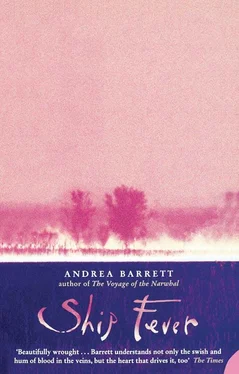He had not called on Susannah to say farewell. Instead he’d sent her a brief, businesslike note, wishing her well in her efforts and telling her his destination. He’d asked that she welcome Arthur Adam home for him, thinking Arthur Adam would be sailing up to the King’s wharf any day, but he had not said, though he often thought: “What if I can’t do what’s asked of me? What if all my training isn’t enough?” She believed he was vain, and she might be right. He could not conquer his fierce desire to be recognized as intelligent and competent.
How tired he was of himself! He thought of Arthur Adam across the ocean, wielding his pen on behalf of the people he met, and he tried to set his self-absorption aside and concentrate on what he was seeing. Something that looked like a fort, something else that might have been the hospital — these disappeared in the trees as the St. George moved on. The island could not be more than three miles long, and was very much narrower than that. So green, so seductively rural. Brown cows grazed, all of them facing him. Parts of the countryside outside Paris had looked like this, offering the same relief from the sights of the crowded city. The view changed as the steamer rounded a point; a small village, and low white buildings near the water that might be the quarantine station. Beyond the wharf jutting into the river at the foot of the village, eight or ten large ships lay at anchor. A number of small rowing boats bustled among them, but Lauchlin could not determine what they were doing.
As the St. George eased alongside the wharf, a slight man in a straw hat came trotting down the planks and prepared to board a boat in which four rowers sat ready. He paused to watch the St. George tie up, and to exchange a few words with its pilot. In their conversation, Lauchlin thought he heard his own name. He smoothed his clothes and hair and took several deep breaths, aware that his hands were trembling. A few seconds later, the man cupped his hands to his mouth and shouted, “Dr. Grant! Dr. Lauchlin Grant!”
“Here,” Lauchlin said quietly; the man was no more than ten feet away.
“Wonderful!” the man said. “Come, come, come! I’m late already for the afternoon rounds, you’d better come with me and see what we’ve got. Three more ships came in at noon.” As he talked he guided Lauchlin off the steamer, down the wharf, and toward the boat where the rowers waited.
“But my luggage…” Lauchlin said. He was tired and hungry and a little queasy, as well as worried about his trunk. In it was everything important to him: his medical books, his lancet and lancet-case, a thermometer, some bandages, and some drugs. Morphine, calomel, ipecacuanha, sulfate of zinc, copper salts, sodium bicarbonate, sweet spirit of nitre, Dover’s powder. Some Madeira and brandy, of course, and a few sets of clothing. The man brushed his hesitations aside.
“Leave your trunk here, someone will take it up — Dr. Douglas arranged a room for you in the village. We’re delighted you’ve come. Just sit here, fit yourself in this corner if you can.”
If this wasn’t Dr. Douglas, who was it? The boat pushed off before Lauchlin had settled himself, and he banged his knees against the seat in front of him. He looked up to find a small, creased hand thrust at his waist. “Dr. Jaques,” the man said. “Inspecting physician. Pardon my manners. All this rush — but you’ll understand when you see. No one expected this. We’re very glad you’re here.”
“Glad to be here,” Lauchlin said.
And for the moment, despite the odd flurry of landing, he was. His last patient, before he closed the office, had been a wealthy neighbor who complained that his liver pained him when he drank more than a bottle of wine at dinner. Clutching the bulging flesh below his ribs, he’d whined like an old man but declined to modify his diet. But here were people, Lauchlin thought, among whom his skills might be useful. Almost surely there’d be dysentery, and perhaps a few cases of ship fever; also all the effects of the long starvation about which Arthur Adam had warned him. He braced himself; this was what he was trained for. Meanwhile he took care to sit with his back straight and his chin set, looking over the shoulders of the men who rowed.
It was several minutes before he noticed the water. No longer clear and blue, it was now streaked with dirty straw in which larger objects were suspended. Something floated past him that looked remarkably like a pillow; then several barrels, a blackened cooking pot afloat like a tiny boat, a mass of rags, and some broken planks. There were corked bottles half-filled with clear yellow fluid the color of urine, and baskets lined with scraps of maggoty food. A soggy bed-tick, still kept afloat by pockets of air in its stuffing, elicited a curse from one of the rowers. Two high-crowned hats spun on the water behind it.
“What are these?” Lauchlin asked Dr. Jaques. “These…things?”
Dr. Jaques was impatiently directing the rowers; they were nearing one of the ships. On the rigging white banners fluttered. It took Lauchlin a minute to realize the banners were tattered clothes, hanging out to dry.
“That’s the way they clean,” Dr. Jaques said shortly. “The captains aren’t idiots, even though the British ones run their ships like slavers. Before they signal that they’re ready for us to come, they tell the passengers that we won’t keep them in quarantine if the steerage looks clean. They bully the passengers into throwing all their filthy bedding overboard, all their cooking utensils, the nasty straw: it gets foul down there — have you seen one of these holds? There are no…facilities, and the floors fill up with excrement and filth. They shovel the worst of it into buckets and heave it into the river before we arrive.” He pushed his hat back on his forehead and rubbed at the damp line there. “Sometimes they knock out the berths and toss the planks as well. If they’re healthy enough, they’ll scrub out the place with sand and water, maybe throw on a coat of whitewash. If you didn’t know better, you might think they’d sailed over under reasonable conditions. But you’ll see for yourself — although if this ship is anything like the ones that came in last week, you won’t find much cleaning’s been done.”
Lauchlin nodded, as if this were no less than what he’d expected. He stared at the floating filth and fought down the bile in his throat.
The next half-hour passed in a flurry that left him dumbfounded. On the deck, and then to the captain’s cabin; Dr. Jaques barking out orders and questions. Was there sickness on board? What kind? How many passengers dead and buried at sea? Any dead as yet unburied? How many patients now? The captain, Lauchlin saw, looked as confused as himself. Dr. Jaques had a tablet of paper, on which he scribbled the captain’s answers to his questions. He passed the captain a small book: “Directions,” he barked. “This will explain our procedures. But you must not expect everything to go as stated here. We have room for 150 patients in the hospital, and already we’ve 220 there. No beds. No beds, you understand — we’re building a shed, but we’re dangerously overcrowded already. We’ll do what we can. We’ll take some, the worst cases. The rest will have to be cared for on board until we make other arrangements. The hold, please.”
And then he was trotting back along the deck and down the hatch into the hold, Lauchlin at his heels. The smell was staggering. A single oil-lamp hung from the ceiling, and in the dim light Lauchlin saw the stalls and the narrow passages between them. Within the stalls were rows of bare berths stripped of their bedding and hardly more than shelves. In an open area, scores of unshaven men and emaciated women huddled together, some weeping. Children lay motionless. An old man sat on the floor, leaning his back against a cask and gasping for breath.
Читать дальше
Конец ознакомительного отрывка
Купить книгу












